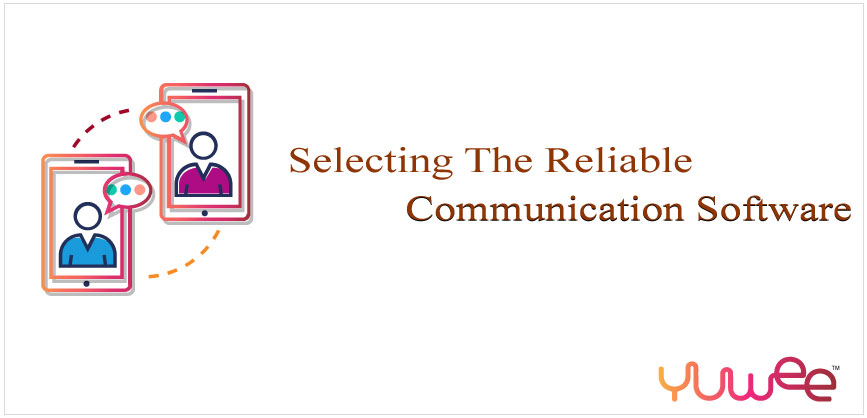
So, undependable business phone service might ruin efficiency and productivity between your employees. As a result, poor customer service and encounter.
Nonetheless, choosing a reliable communication software might appear difficult, but spotting a good phone system does require you to be an expert. Here is a simple but applicable guide to assist you in choosing a reliable communication software for your business.
You require a reliable communication software
Selecting a reliable communication system has two options:
- Traditional landlines via a contract with a service provider. Or,
- A VoIP service.
Even so, every choice has its specific uses. Thus, it depends on the functioning of your business and the use of phone system. Landlines are desk-fixed systems which need a traditional wired connection from the wall socket of the phone to the public network of the operator. On the contrary, VoIP solutions utilizes an IP phone, and change voice communications to data packets for transmission in your broadband line. Also, VoIP systems provide premium features and abilities.

Landline Against VoIP Phone Systems
Researching on the main features and gains provided by both is the only means of deciding which is fit for your business. After that, decide which choice that best fits your business requirements.
Dependability
They both provide 99.9% dependability. But, the only benefit provided by a landline is in case of power outage. Because the connection of traditional phones is not from the main source, power outage does not affect them.
However, the dependability of VoIP systems is increasing rapidly. Because, they are connected to increased fiber optic penetration, as well as high bandwidth broadband. As a result, their dependability will soon exceed that of landlines.
Technology Variations
For landlines to function, they need traditional hardware. Further, this hardware requires maintenance, as well as upgrading with time. The maintenance and upgrading costs adds to the starting investment costs. Also, the addition of an on- premise PBX to the system for premium features makes the starting investment and maintenance costs high.
On the other hand, VoIP calls get created using software. This software might get updated free of charge by your VoIP service provider. Thus, businesses have a broader option of equipment which they may utilize for making VoIP calls.
Landlines provides tighter security. But, they can get hacked through tapping by external agencies. On the contrary, VoIP systems are more susceptible to getting hacked, because they use software and internet connection. Nonetheless, this is rare because most VoIP service providers have different security levels of their systems.
You can try a unique and enhanced cloud communication platform for your effective business communications..
Cost
Apart from adaptability and premium features, cost is among the primary benefits of VoIP. The initial investment cost, setting up, and maintenance of a landline is expensive. Also, VoIP calls are cheaper. Based on the number of lines, call bundles, and calls made, VoIP systems are much cheaper than landlines.
Features Available
Basically, basic features like waiting messages, three-way calling, voicemail, blocking, and call-forwarding get provided by both landlines and VoIP systems. However, managing and controlling these features is easier with VoIP systems.
Even so, VoIP is more beneficial in terms of features, as it provides premium features like virtual numbers, ring groups, conferencing, call recording, IVR, and reception console. On the other hand, enjoying such features on a landline requires you to purchase an expensive PBX system.
Functioning
Landlines are fixed to the desk. Although some handsets are cordless, the base station remains connected to the wall socket. Also, landlines get operated by traditional operators like AT&T or BT. Further, they get supplied under contract as single or many lines to the providers, on a monthly basis pay.
On the contrary, a VoIP service needs a softphone or IP phone for making calls over the internet. Also, analog signals get converted to digital signals, and the data get sent over high-speed broadband. A good example of a VoIP service is Skype.
In addition, the end device of a VoIP service can be a softphone, or a traditional landline that has a VoIP adapter connected on the wall socket. For example, an app on a smartphone, a laptop, or a desktop handset. As a result, there is a lot of adaptability.
It is argued that landlines provide good resilience because they do not get powered by electricity. This means power outage cannot halt your business. Also, it is argued their voice quality is better. Nonetheless, this is not the actual case.
VoIP data get transmitted over the internet. Thus, heavy network traffic or poor connection might affect it. Also, it is argued that the voice quality of VoIP is better than that of landline if fiber optic is the broadband connection.
Summary
Your communication software should be reliable to fit the needs of your business, as well as those of your customers. VoIP is the best and cheapest choice for a company with mobile and remote workforce, and those that need premium features. On the other hand, landlines are ideal for businesses that has a desk-bound workforce which does not require premium abilities.
If you are still facing problems with the quality of calls, you can try enhanced Voice API.
